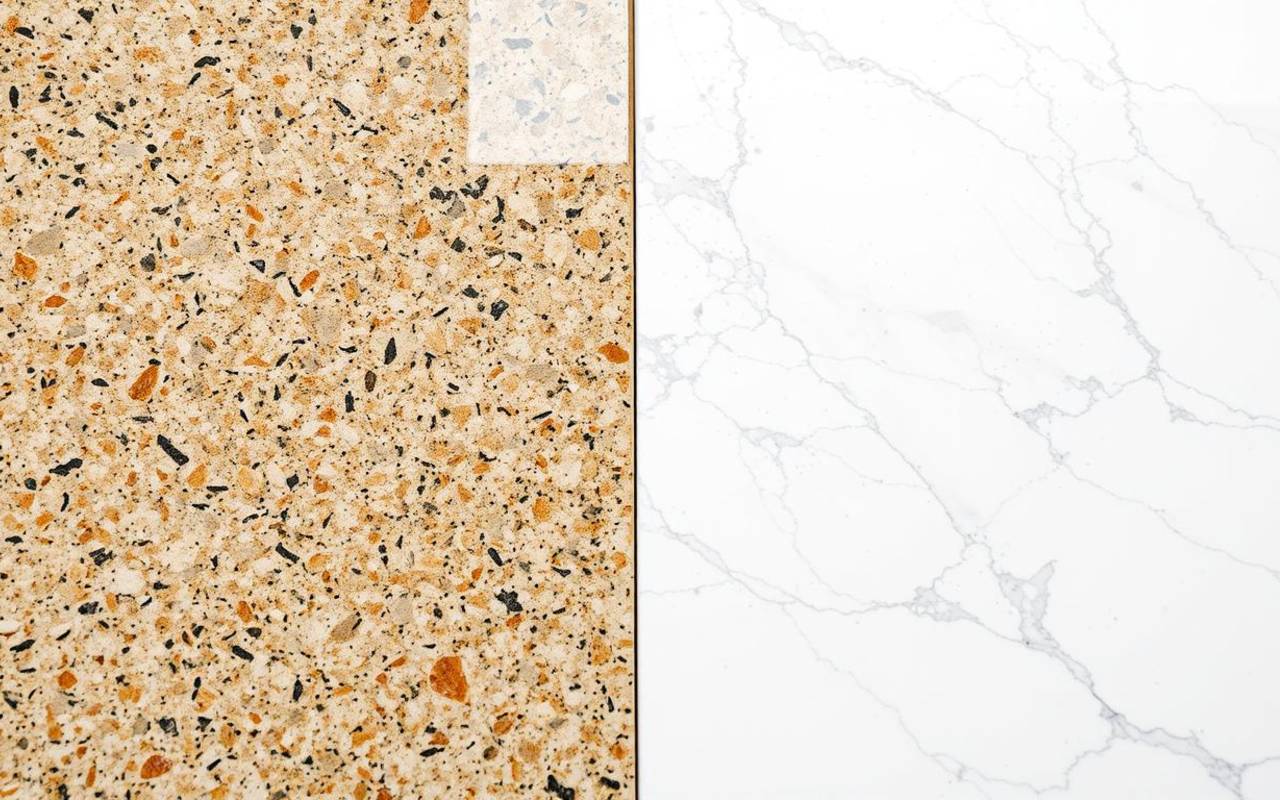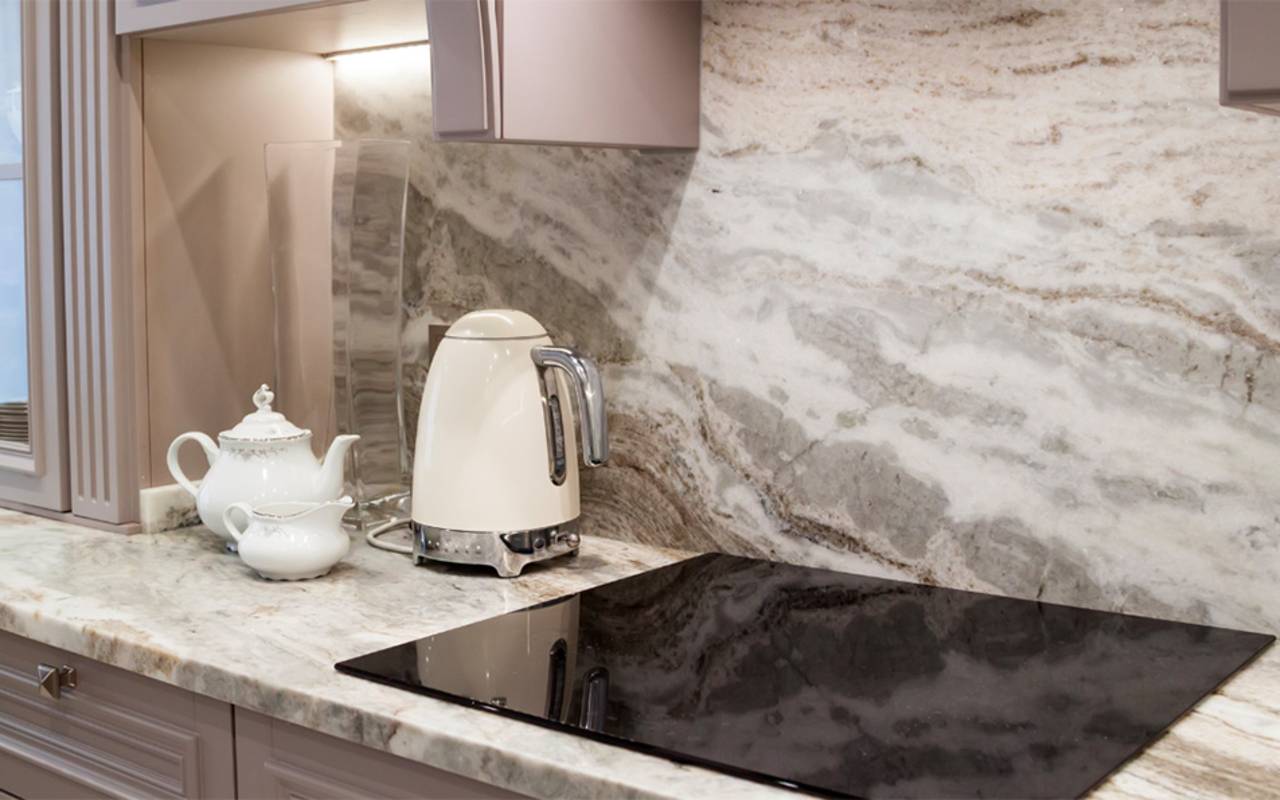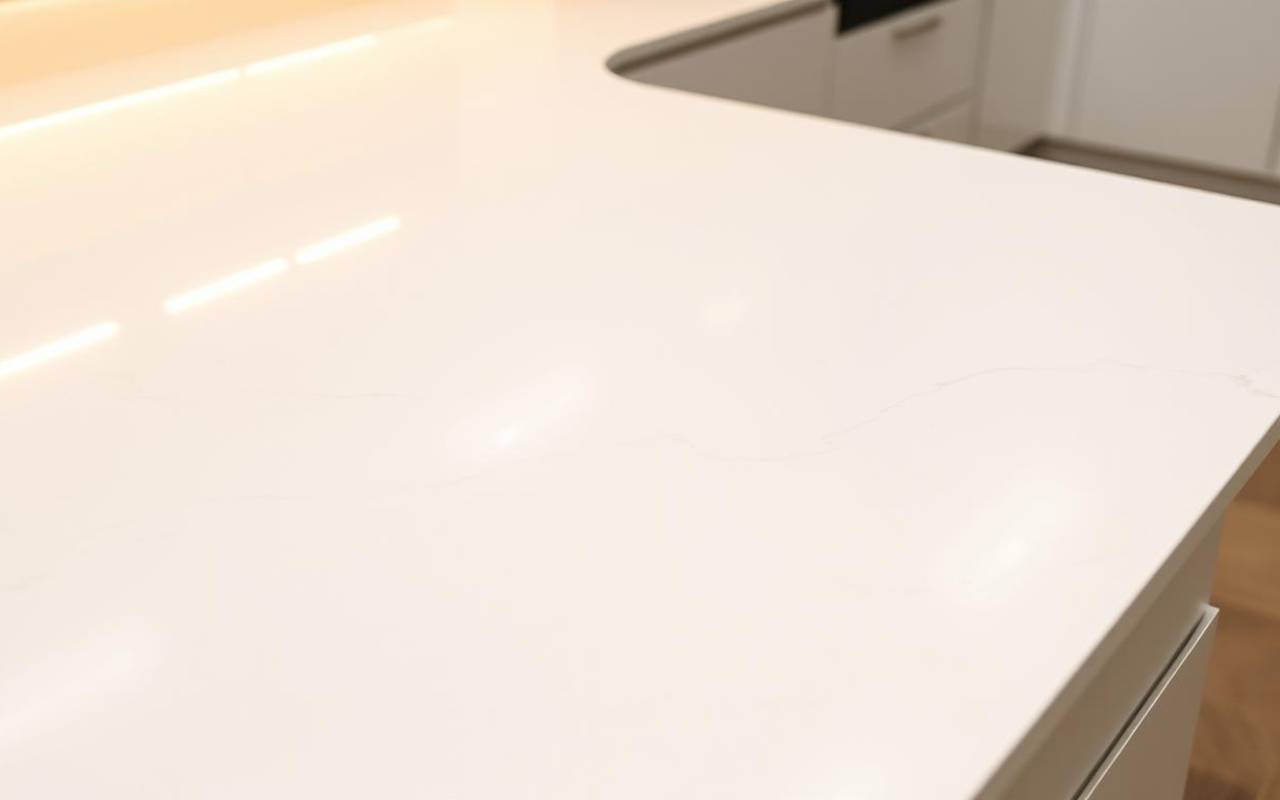Table of Contents
Two decades ago, choices for countertop materials in American homes were few. Now, 64% of new homes have luxury stone countertops. This highlights a shift in what homeowners prefer. It shows the importance of picking the right countertop for its look and use. Choosing between granite’s natural charm and the smooth uniformity of engineered quartz is a big decision. Knowing the details of each is key for choosing Granite vs. Engineered Quartz.
This comparison of Granite vs. Engineered Quartz will explore what makes granite and engineered quartz popular. We’ll discuss the benefits and drawbacks, look into costs, and their value over time. Also, we’ll see how they fit with current design trends. Your journey to a wise choice starts now.

Key Takeaways – Granite vs. Engineered Quartz
- Discover the significance behind the growing preference for stone countertops in modern homes.
- Learn the differences and similarities when considering granite vs. engineered quartz for your countertops.
- Understand how aesthetics, durability, and cost are essential factors in your countertop decision-making process.
- Prepare to explore which material might offer the best countertop material for your home’s style and needs.
- Anticipate a comprehensive comparison that will empower you with knowledge to make the right choice.
Understanding Granite and Engineered Quartz
When choosing materials for kitchen countertops, the main choices are often between natural stone and quartz countertops. Both granite and engineered quartz have unique benefits and designs to fit different tastes. By understanding both, you’ll be better able to make the right choice for your home.
What is Granite?
Granite is a natural stone loved for countertops for many years. It forms when magma cools and each piece is unique, with its own pattern. This results in a wide variety of colors and designs, making every granite countertop special. It’s also very strong, perfect for busy kitchens.
What is Engineered Quartz?
Engineered quartz countertops, unlike granite, are created by combining natural quartz with resin and pigments. This process creates more color and design options than natural stones offer. Known for its consistent patterns, engineered quartz is perfect for a sleek kitchen look. It’s also durable and resistant to stains.
Historical to Modern Use in Countertops
Granite has been valued for centuries, used in both monumental architecture and countertops. Its use in modern kitchens signifies both luxury and toughness. Engineered quartz provides a customized look similar to natural stone but without pattern inconsistencies. It has gained popularity in homes for its practical benefits and lower environmental toll than natural stone mining.
The Aesthetics: Comparing Looks and Styles
Choosing between granite and engineered quartz depends a lot on looks. Both have visual benefits that could make your kitchen shine. Learn about granite’s natural beauty and engineered quartz’s consistent look and how they affect your home.
Granite stands out for its wide range of colors and patterns. Each piece is unique, making your kitchen or bathroom special. Besides being tough, granite adds a unique touch of beauty to your home’s style.
Meanwhile, engineered quartz shines with its uniform colors and patterns. It’s perfect for achieving a cohesive home design. Engineered quartz mimics natural stones but is easier to care for and very strong.
Both materials fit well with many design trends, whether your home is modern or traditional. The choice between granite’s vibrant beauty and engineered quartz’s sleek patterns brings different aesthetic
Choosing granite or engineered quartz often depends on your taste and your home’s design goals. Think about whether you want your home to feel natural with granite or modern with engineered quartz. Both are great choices, but the final pick will shape your space’s feel.
Granite vs. Engineered Quartz: Durability and Maintenance
When you’re picking between granite and engineered quartz countertops, it’s key to know about their durability and upkeep. Each offers great qualities, yet how they hold up and what they need can sway your choice.
Granite countertop durability stands out because it’s really hard and can resist scratches and chips. But, to keep its strength, you must regularly seal it. This helps avoid stains and water damage. Meanwhile, engineered quartz maintenance is easier since it doesn’t need sealing. Its non-porous surface means it needs less care.
| Feature | Granite | Engineered Quartz |
|---|---|---|
| Scratch Resistance | High (require sealing) | High |
| Chip Resistance | Good | Very Good |
| Heat Resistance | Excellent | Good (with precautions) |
| Maintenance | Requires periodic sealing | Minimal (no sealing required) |
Looking at heat resistance, granite edges out engineered quartz. It’s better at handling high heat, which is a big plus in kitchens. But, engineered quartz can be sensitive to very high temperatures. So, it’s wise to use trivets and hot pads to keep its surface safe.
To make your countertops last, taking care of them is key. If you go with granite, you’ll enjoy its unique looks and heat resistance. If you choose engineered quartz, its even look and low maintenance might appeal more. But each material needs the right care to keep looking and working well over time.
Cost Analysis: Initial Investment and Long-Term Value
Choosing the best countertop material for your home is a big financial decision. Granite and engineered quartz vary in cost due to differences in quality, installation needs, and location-based pricing.

Granite offers a range of prices, making it more budget-friendly. Engineered quartz, while pricier, provides great durability and a sleek look. This might make it worth the extra cost for some.
| Material | Initial Cost | Long-Term Value |
|---|---|---|
| Granite | $35 – $75 per square foot | Increases property value; lasts 10+ years |
| Engineered Quartz | $50 – $120 per square foot | High resale appeal; lasts 15+ years |
Both granite and quartz boost your home’s resale value as they’re seen as premium upgrades. Yet, the long-life and easy upkeep of engineered quartz may mean a better long-term investment, even with its higher initial cost.
- Granite requires periodic sealing to maintain its surface integrity and appearance.
- Engineered quartz is non-porous and doesn’t require sealing.
When deciding between granite and engineered quartz, think about both now and later costs. The right choice depends on what you can spend now and what benefits you want in the future.
Environmental Impact and Sustainability Factors
Choosing between granite and engineered quartz involves looking at environmental impact and sustainability factors. Each has its own process of production and life cycle that affects the environment. This choice is key for those who care about the planet.
Granite is a natural stone, and its quarrying impact is big. Taking it out of the earth uses a lot of energy and changes the land a lot. Engineered quartz, though, is about 90-95% natural stuff and 5-10% polymer resins. This uses less natural resources but adds synthetic materials to the mix. You can learn more about this at the environmental impact of quartz countertops.
| Material | Quarrying Impact | Manufacturing Energy Use | Recyclability |
|---|---|---|---|
| Granite | High | Medium | High |
| Engineered Quartz | Low | High | Low |
Engineered quartz needs more energy to make than granite. The reason is the mixing and binding of quartz particles with resins. This process makes the product durable and nice-looking. But, it raises the energy used in production.
When we talk about recyclability and environmental footprint, granite is better. It’s 100% natural and can be used again without losing quality or looks. But it’s harder to recycle engineered quartz. The synthetic resins it contains make recycling difficult.
Knowing these sustainability factors helps you choose better. It’s important to compare the environmental impact of each. Sometimes, using a bit of both materials can be the best choice for the environment.
Granite and Engineered Quartz in the Kitchen
When picking out natural stone countertops or quartz countertops, it’s key to know their perks. Both look great and offer benefits like food safety and boosting your home’s value.
Granite brings a special touch with its varied colors and patterns. Each countertop is one-of-a-kind. Quartz has a consistent look thanks to its engineering. But there’s more to it in the kitchen. Let’s explore how these tops handle daily kitchen activities.
Food Safety and Hygiene
Kitchen tops need to be safe for handling food. Quartz countertops don’t let bacteria and mold grow because they are non-porous. This means they’re super hygienic. No need to stress about food juices causing contamination.
Granite tops need a bit more care since they are porous. But with regular sealing, they stay clean and look good. This keeps your kitchen clean and safe.
Impact on Home Resale Value
Natural stone countertops and quartz countertops can raise your home’s resale value. They are durable and appealing, which attracts buyers. A good kitchen can make your house more desirable, giving you a better return when selling.
Choosing Based on Kitchen Use and Lifestyle
Your lifestyle and how you use your kitchen should guide your choice. If you entertain often or cook a lot, quartz’s low maintenance may appeal to you. If you love natural beauty and don’t mind the extra care, granite might be your pick.

In the end, it’s about what balances looks, function, your budget, and value. Whether you prefer granite’s natural charm or quartz’s neat finish, the right countertop can make your kitchen better and add value to your home.
Pros and Cons: Benefits of Granite
When choosing natural stone countertops, many homeowners pick granite for its looks and practicality. In this section, we’ll explore the key benefits of granite. We’ll talk about its beauty and how tough it is, which make it shine among countertop options.
Natural Beauty and Uniqueness
Granite’s natural beauty is stunning. Every piece is different, showing off a variety of crystal patterns. From quiet earthy tones to vibrant designs, no two granite countertops are the same. This unique quality makes granite a top choice for adding natural sophistication to kitchens and bathrooms.
Granite Countertop Durability
Granite is known for being very hard and scratch-resistant. It can handle heat and heavy use, ideal for busy kitchens. With proper care, like regular sealing to avoid stains, granite stays looking new for years.
Here’s a look at granite compared to other countertop materials:
| Material | Durability | Heat Resistance | Maintenance | Esthetic Value |
|---|---|---|---|---|
| Granite | High | High | Moderate | Unique Variations |
| Engineered Quartz | Medium | Medium | Low | Consistent |
| Laminate | Low | Low | Low | Flexible Styles |
However, granite isn’t perfect. It needs more upkeep than man-made materials like quartz. This includes regular sealing to block stains. Even though granite is often less pricey than quartz, it can still be a big expense, especially for custom designs.
Deciding on granite depends on what you need and like. Thinking about the benefits of granite and its beauty might make it the ideal choice for your natural stone countertops.
Pros and Cons: Benefits of Engineered Quartz
Engineered quartz countertops mix beauty and practical use in kitchens and bathrooms. By choosing quartz, you get a long-lasting surface that looks great. Let’s explore why these surfaces are a top choice for many homes, and also some concerns to think about.
Consistency in Design and Appearance
- Uniform color and pattern distribution
- Wide range of customizable color options
- Seamlessly integrates with modern and classic decor
- Non-porous surface resists bacterial growth
- Easy to clean with just soap and water; no need for harsh chemicals
- High resistance to stains and scratches aids in maintaining pristine condition
Engineered quartz is praised for its design consistency and easy upkeep. Yet, it’s important to note it’s not as heat tolerant as real stone. High heat can harm it. And, while quite tough, it isn’t ideal for outside kitchens since UV light can make colors fade.
Still, engineered quartz is favored by many for upgrading their homes. It brings together looks and function in one. Investing in quartz countertops can really pay off, adding both beauty and usefulness.
Popular Countertop Choices: Making the Right Decision for Your Home
Choosing the right countertop is vital in any renovation or new home project. There are many materials to choose from. It’s essential to think about how it looks and how it works for your daily life. This decision impacts your home’s design and your day-to-day activities in kitchen or bathroom areas.
Evaluating Your Home’s Design and Needs
Start by looking at your home’s style. Do you prefer a modern or traditional look? Countertop materials can enhance your theme in unique ways. Besides style, consider the best countertop material for durability and care. Granite, for instance, looks luxurious and lasts long. On the other hand, engineered quartz looks sleek and is easy to maintain.
Consideration of Lifestyle and Usage
- Frequency of Use: How much do you cook, and what’s your cooking style? Granite counters can handle a lot of heat and use.
- Maintenance Requirements: Are you okay with upkeep, or do you prefer something simpler? Quartz needs less care than natural stone.
- Longevity and Durability: Thinking of staying put for a while? Pick a countertop that will last in both style and usage.
To sum up, your countertop choice should match your design tastes and fit your lifestyle. Whether you choose durable granite or sleek quartz, the perfect selection will make your home more functional and beautiful.
Conclusion – Granite vs. Engineered Quartz
When we compare granite and engineered quartz, we see two top-notch materials. Each one has its own special benefits. Granite brings a one-of-a-kind look and a strong feel. People have used it for a long time because it lasts and looks timeless. Engineered quartz, however, offers a smooth look with less upkeep. Choosing between them goes beyond price. It’s about matching your lifestyle and design likes with what works best over time.
Think about more than just if they can resist scratches or how they look. Consider how they impact the environment and the value they add to your home. Maybe you like granite’s natural beauty and old-school charm. Or you might prefer the sleek look and modern vibe of engineered quartz. Your choice should fit your needs and make your space more beautiful.
Knowing the differences, including how easy they are to keep up and their effect on the planet, helps you choose wisely. The right countertop makes your life better and boosts your home’s look. This guide shows granite and engineered quartz are both great. But the best choice is the one that meets your unique needs. Whether you want something made by nature or by innovation, your ideal kitchen surface is out there.
FAQ – Granite vs. Engineered Quartz
What are the main differences between granite vs. engineered quartz?
Granite is a natural stone, each piece unique in patterns and colors. It needs sealing now and then for upkeep. On the other hand, engineered quartz is man-made, offering consistent looks and is easier to maintain, without needing sealant.
How do granite and engineered quartz countertops compare in terms of durability?
Both materials are very strong. Granite resists scratches and chips well. Engineered quartz matches this durability and is also less likely to stain.
Can engineered quartz withstand high heat?
Engineered quartz isn’t as heat resistant as granite. To protect it from heat, use trivets or hot pads under pots and pans.
What is the environmental impact of using granite vs. engineered quartz?
Mining granite can hurt the environment due to its extraction process. Making engineered quartz uses a lot of energy but can include recycled materials. Both have environmental issues to think about.
Which is more cost-effective: granite or engineered quartz?
Prices for both vary based on quality and installation complexity. Entry-level granite might cost less than quartz. But, high-end granite could be pricier than quartz.
Are granite countertops more valuable than engineered quartz countertops in terms of home resale value?
The value to a home can depend on current trends and what buyers like. Both materials are popular and can boost a home’s value. The final choice often reflects personal taste and the house’s style.
What are the maintenance requirements for granite vs. engineered quartz countertops?
Granite needs resealing every so often to stay non-porous. Engineered quartz needs no sealing, making it simpler to keep clean and maintain.
How do I choose between granite vs. engineered quartz based on my lifestyle?
If you like unique looks and don’t mind some upkeep, granite might be right for you. If you prefer ease of maintenance and consistent designs, engineered quartz could be better.
Can granite vs. engineered quartz be used in outdoor kitchens?
Granite works well outdoors because it resists UV rays and lasts long. Engineered quartz isn’t good outside since it can fade and warp in sun and weather.
How does food safety compare between granite vs. engineered quartz countertops?
Both are safe for preparing food. Engineered quartz’s non-porous surface may be more hygienic, as it resists bacteria and stains better with proper cleaning.

